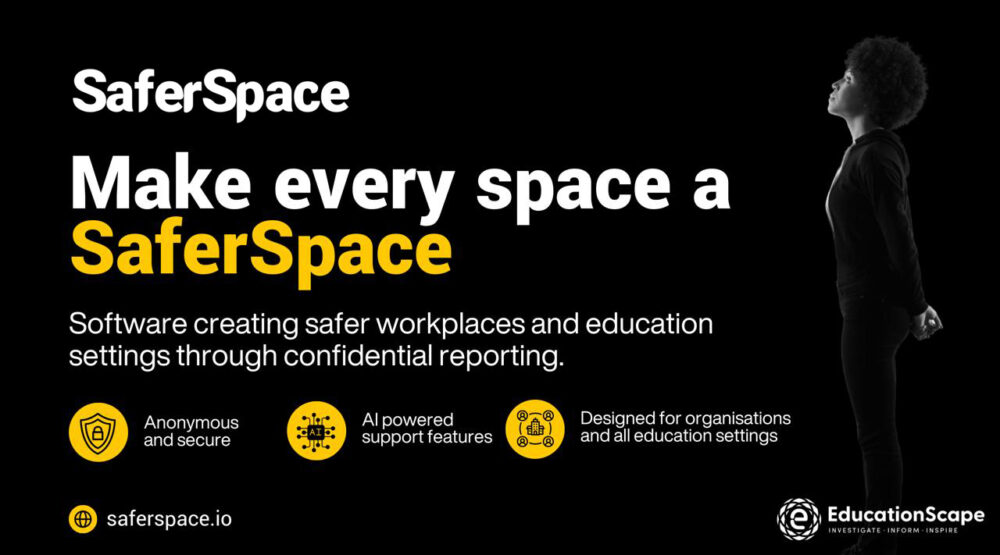SaferSpace is a new digital reporting and governance platform launching across the education sector to meet today’s safeguarding and compliance demands. First developed in 2024 and refined in partnership with EducationScape, it’s built to support institutions in meeting the requirements of Ofsted, the Office for Students (OfS), the Prevent Duty, and Keeping Children Safe in Education (KCSIE). SaferSpace brings everything together in one secure, accessible system – helping providers protect their communities and prove they’re doing it right.
A safer, smarter way to report
At its core, SaferSpace is a simple but powerful concept: an intuitive, secure platform where learners and staff can report concerns in confidence. Whether it’s bullying, discrimination, abuse, harassment or any other behaviour that compromises safety or dignity, SaferSpace ensures that no issue is left unheard.
This is particularly vital when it comes to sexual harassment, which remains one of the most persistently underreported issues in education. A 2021 national review by Ofsted found that nearly 90% of girls in some secondary schools had experienced misogynistic language or unwanted sexual attention. In higher education, studies show that almost one in three female students report being subjected to inappropriate sexual behaviour during their studies – with many never disclosing it due to fear, shame, or a belief that nothing will be done. Staff are not exempt from these risks either, often facing similar barriers to speaking out.
Apprentices, who navigate both the classroom and the workplace, are especially vulnerable. A Department for Education report revealed that many apprentices are not adequately informed about their rights or how to raise concerns – leading to harmful experiences being internalised and ignored.
Too often, sexual harassment is allowed to persist in the shadows – not because institutions don’t care, but because they lack the tools, processes or confidence to respond effectively. Evidence shows that reports are frequently missed, mishandled or deprioritised, leaving individuals unsupported and behaviour unchallenged.
SaferSpace removes these barriers. It offers a trusted, confidential route to report concerns – including anonymously – while providing clarity around what will happen next. By supporting early intervention, structured follow-up and consistent, transparent action, it allows institutions to take harm seriously and act decisively. It allows colleges, universities and training providers to demonstrate a culture of zero tolerance – not just in policy, but in day-to-day practice.
Built for compliance and culture change
Navigating the regulatory landscape can be complex. SaferSpace is designed to support FE and HE institutions in meeting their obligations, and going beyond them, across three key areas:
- Ofsted: Safeguarding remains a core focus of inspection. SaferSpace supports compliance by capturing detailed records, ensuring robust follow-up, and providing governance dashboards that demonstrate a proactive safeguarding culture.
- Office for Students (OfS): The OfS expects providers to prevent and address harassment and misconduct while strengthening the student voice. SaferSpace gives institutions a clear mechanism to show they are listening, acting, and continually improving.
- Keeping Children Safe in Education (KCSiE): This statutory guidance sets out the legal duties for schools, colleges and providers to safeguard and promote the welfare of children and young people. SaferSpace supports compliance with KCSIE by providing a clear, confidential and accessible way for learners and staff to report concerns. It enables designated safeguarding leads (DSLs) to record, triage and manage disclosures in line with best practice, ensuring that no issue is missed, and that appropriate action is taken every time.
- Prevent Duty: Colleges and universities are expected to protect individuals from radicalisation and extremist influence. SaferSpace supports this by enabling early, confidential reporting of concerns, with clear pathways for triage and appropriate referral.
By combining practical functionality with policy alignment, SaferSpace helps institutions not only meet their obligations, but build credibility and trust with inspectors, stakeholders and, most importantly, their communities.
Developed by experts, informed by experience
SaferSpace has been developed with input from safeguarding professionals, HR leads, legal experts, and individuals with lived experience of harassment and discrimination. The result is a platform that works across the full spectrum of educational settings and is sensitive to the realities of those most at risk.
Its intuitive design ensures ease of use for both those raising concerns and those responsible for managing them. Reports are triaged securely and confidentially, aligned with internal safeguarding and HR policies, and tracked from submission to resolution, all in one place. SaferSpace also features a built-in chatbot aligned to the Equality Act, allowing staff and students to check whether their experience may constitute a breach of equality law or relate to one of the nine protected characteristics. This provides users with clarity and confidence, especially when dealing with complex or sensitive issues.
Whether submitted anonymously or not, every report is taken seriously, enabling institutions to respond consistently and supportively.
Oversight and accountability at every level
For governors, senior leaders, designated safeguarding leads, safeguarding and HR teams, SaferSpace acts as a central hub for governance. Real-time dashboards provide a clear view of reporting activity, trends across campuses, case progress, and response times.
This level of visibility helps institutions identify emerging issues, allocate support effectively, and demonstrate compliance with internal policies and external frameworks. In large or multi-campus institutes, where information can become siloed or inconsistent, SaferSpace offers a reliable, secure system of record.
The impact: a culture of safety and trust
SaferSpace supports the creation of environments where staff and learners alike are free from harm, harassment and intimidation, whether physical, psychological or digital. It sends a clear message: speaking up is supported, taken seriously, and leads to meaningful action.
This is about more than safeguarding. It’s about establishing a baseline of safety and mutual respect, one where everyone knows inappropriate behaviour will be addressed, not ignored.
By embedding SaferSpace into institutional culture, education providers can move from reactive to proactive, from firefighting issues to preventing them.
Set the standard: join the first wave of SaferSpace adopters
SaferSpace is launching across the education sector, with several early adopters preparing to roll out the platform in advance of the new academic year. Further education colleges, sixth forms, training providers and higher education institutions are all being invited to lead the way in transforming how safety, safeguarding and reporting are managed within their organisations.
With growing scrutiny from regulators such as Ofsted, the Office for Students, and the statutory requirements under the Prevent Duty, both FE and HE institutions are expected to show that they can identify and respond to concerns quickly, fairly and consistently. SaferSpace is built to meet these expectations head-on, offering a unified platform that enables individuals to speak up, and equips institutions to take informed, accountable action.
For universities, the platform supports evolving sector-wide efforts to address harassment, misconduct and wellbeing. For colleges and training providers, it offers a clear, centralised system for meeting inspection criteria, strengthening governance, and protecting both learners and staff. In every setting, it helps education providers demonstrate a culture where safety is embedded, not assumed, and where accountability and care go hand in hand.
By adopting SaferSpace, institutions can demonstrate sector leadership, set a new benchmark for compliance and transparency, and take proactive steps toward creating environments where everyone can learn and work free from harm.
Learn more
SaferSpace is now open for demo bookings and early implementation planning. To find out more, visit www.saferspace.io, or speak directly with our team.
Because every member of your community deserves to feel safe. And every institution deserves the tools to make that possible.















Your thoughts